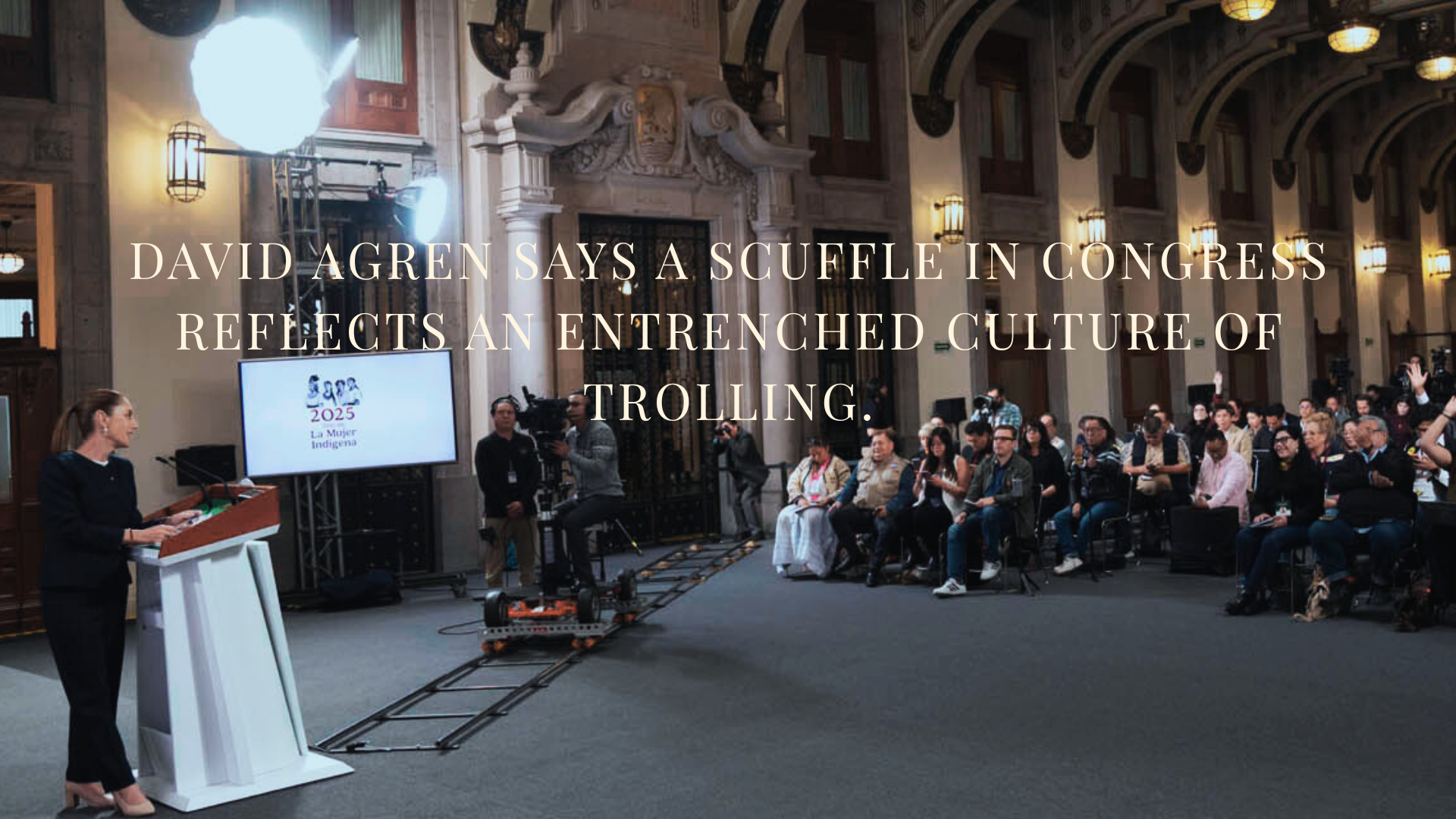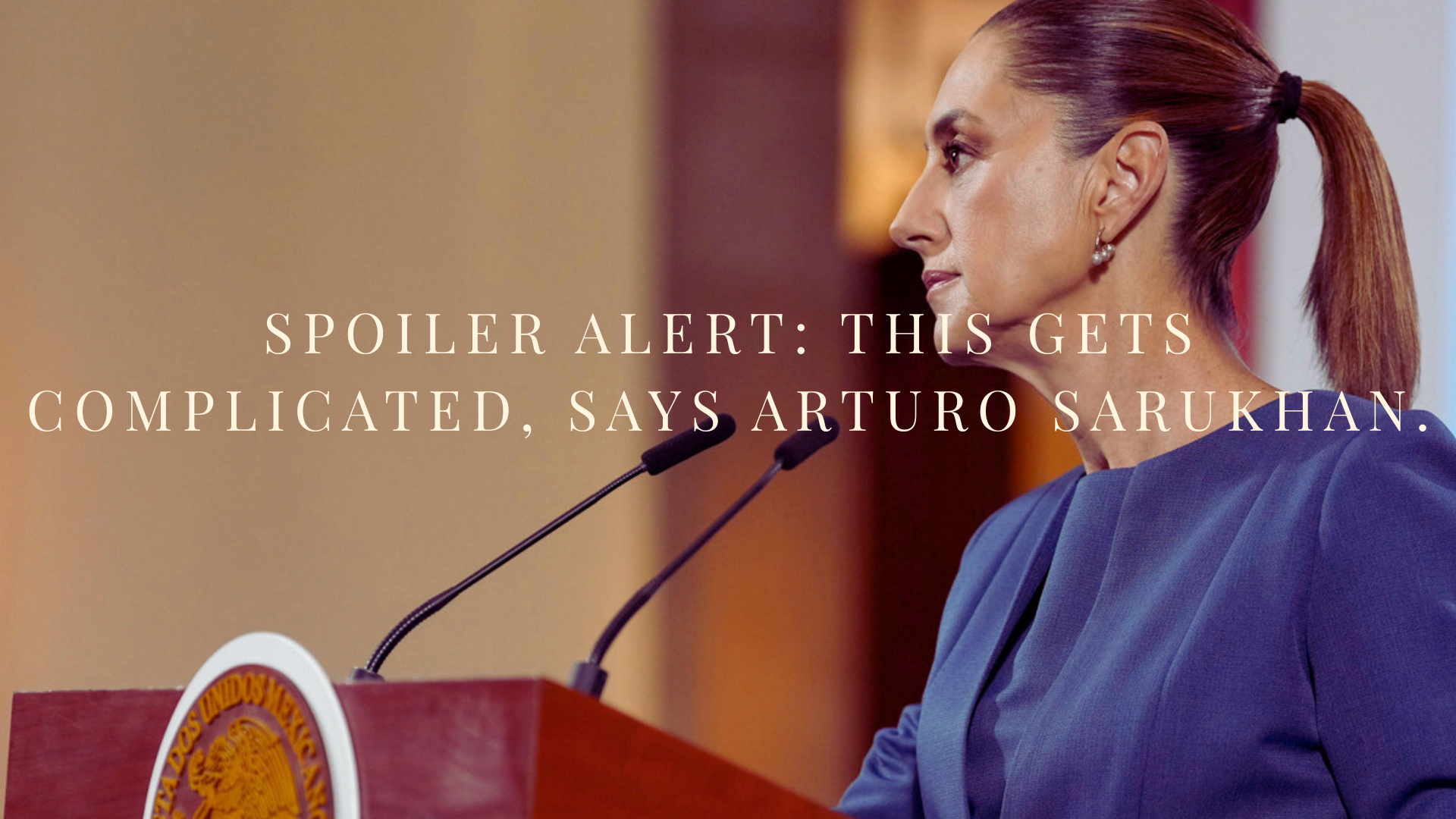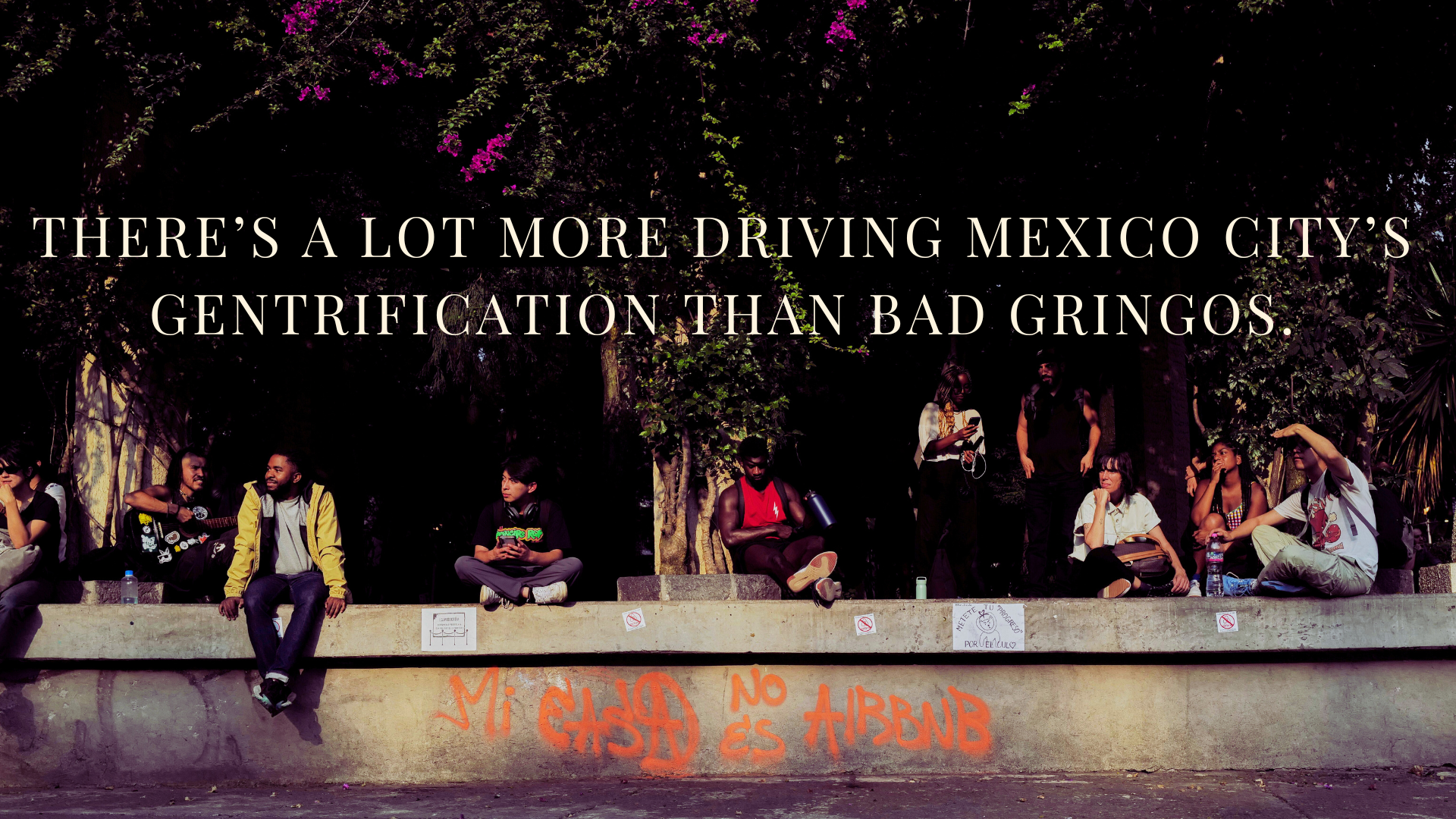
Despite talk of historic cooperation, the divide between Mexico City & DC is deepening
by Luis Rubio, political analyst and Chair of México Evalúa.
Mexico City and Washington are the capitals of two neighboring nations whose interactions are among the most dynamic and complex in the world — yet whose leaderships could hardly be more distant or contrasting. Both countries are about to begin negotiations to review their existing trade agreement, but their perspectives are so different that, if current trends continue, it is hard to imagine a successful outcome.
For nearly two centuries, Mexico and the United States maintained a relationship that fluctuated between closeness and distance, conflict and limited cooperation. The border evolved significantly over time—most notably through Texas’s independence and the U.S. invasion of 1847 — while the Mexican Revolution of 1910 further strained relations as Mexico sought U.S. recognition of the new revolutionary regime. The relationship was functional but tense, full of ups and downs.
In the 1980s, Mexico decided…

Sheinbaum at one year: A ‘complex’ operator emerges
by David Agren, writer-at-large.
President Claudia Sheinbaum swore the oath of office one year ago in a ceremony laden with symbolism as she became Mexico’s first female president. Flanked by female cadets, she took the sash from Infigenia Martínez – a prominent figure on the Mexican left and trailblazer for women in Mexican politics – as lawmakers in the lower house of congress chanted, “¡Presidenta!”
She unveiled the logo for her government, featuring an Indigenous woman. She assumed the presidency with a crushing electoral mandate, capturing more than 60 per cent of the popular vote in the June 2024 election – the highest total since the heyday of Institutional Revolutionary Party (PRI) rule in the 1970s.
But she arrived at the inauguration in the shadow of…

Sheinbaum’s first year has been a contradictory & muddled experiment
Around this time last year I was just arriving back in London, having traveled to Mexico for President Claudia Sheinbaum’s historic inauguration. While I encountered a handful of people already dismissive of Sheinbaum and contemptuous of her MORENA party, most I met were prepared to give the incoming president the benefit of the doubt. Many were hopeful that once in office she would prove as inspirational as the symbolism of her election promised. She had a great deal of political goodwill and capital to burn. One year on, her personal approval continues at stratospheric levels. But her consistently lower numbers on specific policy areas suggest a public aware of the tensions that mark her conflicted and contradictory first year in power.
The conventional wisdom is that on the big ticket items of trade and security Sheinbaum has scored some wins. Her management of the U.S.–Mexico relationship has been cautious but effective. With Donald Trump back in the White House, Mexico’s northern border could have become an economic choke point. Instead, Sheinbaum prioritized the survival of the USMCA, resisting confrontation and avoiding the rhetorical skirmishes her predecessor seemed to relish. In doing so, she not only kept U.S. trade threats at bay but also drew Canada closer as a quiet ally. Marcelo Ebrard has played the role of economic diplomat in chief, constantly negotiating with Washington, reinforcing Mexico’s stance as a stable partner in an era of volatile politics.
Yet a sizeable…

What place does Claudia Sheinbaum want in Mexico’s history?
by Andrew Law, editor and founder.
Mexican President Claudia Sheinbaum became the first woman to deliver the cry of independence from the Presidential Palace this week, coinciding with the 215th anniversary of the nation’s independence. She used the moment to highlight female heroes long excluded from the ritual, remarking that recovering women’s place in Mexico’s history is part of what it means to be the country’s first female president. For generations of girls, she asked, what did it mean to hear only men named as heroes of independence, to never see yourself reflected in the story of your nation?
That a woman was all but guaranteed to win the presidency in last year’s election is a point of pride for a country still marked by machismo and an epidemic of violence against women and girls. This week of all weeks, her symbolism is undeniable, and Sheinbaum was right to recognize her responsibility in correcting the historic record. But one year on, what matters is whether Sheinbaum can turn the fact of being first into a transformative act…


Spoiler alert: this gets complicated
In response to statements emanating from the Mexican presidential bully pulpit that with the United States “we are doing better than any other country,” that “we dialogue with respect and on equal terms,” and that “we coordinate, we collaborate, but we do not subordinate ourselves,”— and also in response to narratives about how Mexico and its president deal with Donald Trump — a steady dose of realism and a reality check - in Mexico’s Congress and across the media, business organizations, and society at large- are urgently required, and we need to carefully weigh where things stand.
While navel gazing in the current juncture of the relationship with the US may feed egos and polls, it’s also dangerous. It can make us short-sighted and cause us to lose sight of the reality looming beyond the horizon. This is especially true since 2018, when Mexico irresponsibly turned its back on the world and on its closest diplomatic and trading partner. But - with Trump having once again kicked the can down the road - Mexico now faces 90 days of uncertainty on tariffs. That’s on top of the looming threat of the unilateral US force against transnational criminal organizations, and a steady stream of pressure points from Washington on a wide-ranging number of issues across our shared bilateral agenda. At no time since her swearing in and — more importantly — during the six months that Sheinbaum’s government has coexisted with the new US administration, has such a national discussion been so urgent in Mexico.
What Mexican governments — both this one and the previous — have failed to grasp is…

The Morena Pact
In 1989, a series of protests and disturbances in China culminated in the massacre at Tiananmen Square, Beijing’s central plaza. The event shook not only China, but also the outside world, which had placed its hopes on reintegrating China into the community of nations. No less important, the bloodshed threatened the country’s ongoing process of economic transformation. Gradually, internal peace was restored, and an implicit social pact was forged that became the cornerstone of the spectacular economic growth that followed. That pact consisted of an implicit exchange: the government would do whatever was necessary to ensure rapid economic and living standard growth, in return for the population’s acceptance of the Communist Party’s exclusive rule and a commitment not to challenge the political system. The result was staggering.
Although Mexico is not — and cannot be — like China, Morena has been gradually advancing toward a similar arrangement, also implicitly. The Morena pact, articulated over the course of the previous sexenio, reveals not only the nature of Morena, with its dogmas and factions, but also the country’s current moment. One way to describe it is as a tacit agreement whereby the population accepts that there will be no economic growth, jobs, or a functioning health system in exchange for the continuation of social programs and cash transfers.
Of course, this is not a formal agreement, nor one that is explicitly recognized, but rather a de facto exchange that was shaped during the previous administration and that now explains the two most relevant factors in national politics: first, the president’s high popularity, and second, the elevated consumption levels among Mexico’s lower middle class — the primary beneficiaries (and clientele) of the government.
This also explains…

Sheinbaum’s monologue diplomacy is meeting Washington’s deaf ear
by David Agren, writer-at-large.
Shortly after rumours started that Ovidio Guzmán – son of imprisoned Sinaloa cartel boss Joaquín “El Chapo” Guzmán – might plead guilty on drug trafficking charges and accept a deal with US prosecutors to turn state’s witness, influencers for Mexico’s ruling party settled on a narrative for denouncing the US government’s actions: It was negotiating with terrorists.
President Claudia Sheinbaum repeated that narrative, too. From the podium of her mañanera press conference, she objected to the deal with the younger Guzmán, while noting the lack of cross-border coordination in the plea bargaining process and reiterating her opposition to the Trump administration’s designation of six drug cartels as foreign terror organizations. "They have a policy of not negotiating with terrorists,” she said. “They decided to designate certain criminal organizations as terrorists. So let them report whether there's an agreement or not."
Sheinbaum’s comments didn’t go unnoticed. Jeffrey Lichtman, Ovidio’s lawyer, plainly stated why the Mexican government wouldn’t be a party to any plea agreement: a lack of trust dating back to 2020 and the decision to send former defence secretary Gen. Salvador Cienfuegos back to Mexico after he was indicted on drug charges in the United States.
The war of words heated up as Sheinbaum, who doesn’t let any slight go unanswered, called Lichtman’s comments “disrespectful” and promised to…

There’s a lot more driving Mexico City’s gentrification than bad gringos
by David Agren.
The acerbic signs and graffiti criticizing gentrification in Mexico City’s fashionable neighbourhoods were certain to capture international attention.
“Spanish is spoken here,” “Mexico for Mexicans,” and, “Go home,” read three of the screeds.
Social media couldn’t get enough of the disorderly protests – with the familiar masked vandals infiltrating yet another march and smashing up storefronts. The Mexico City police were curiously absent. An easy narrative of Americans abroad wearing out their welcome, while ICE cruelly rounded up Mexican migrants in cities such as Los Angeles.
The Department of Homeland Security jumped in with its own snark, posting, “Oh,” above an X Post with protester graffitiing the words, “Not your home,” and a protester waving a sign in English admonishing, “Pay taxes, learn Spanish, respect my culture.
Much of the international media, meanwhile, focused on the core matter of gentrification, which has spread through leafy neighbourhoods such as Roma, Condesa and Juárez – among others – over the past 15 years, driving up rents and forcing some long-term residents to move as their homes became short-term rentals.
The easy hook for any story on gentrification are…

These are Mexico’s five new public security laws, and this is what they do
by Alexandra Helfgott.
President Claudia Sheinbaum has accelerated the momentum initiated by her predecessor to overhaul Mexico’s approach to public security. Her administration has pursued a strategic transformation of the country’s security framework. While these laws are framed as tools for enhancing transparency and accountability, critics argue they threaten the rule of law and civil liberties.
This shift began under President Andrés Manuel López Obrador (AMLO), who in 2019 created the National Guard, a civilian force meant to replace military deployments following the 2006 launch of the War on Drugs. AMLO and allies described the Guard as a temporary force crucial to restoring accountability in security efforts. However, the Guard’s role quickly expanded, taking over customs and border control, infrastructure projects like Tren Maya, and migration enforcement. It evolved into a central pillar of Mexico’s security strategy. Just before leaving office, Congress approved a constitutional reform placing the Guard under military control (Sedena), following a failed 2023 attempt blocked by the Supreme Court.
Less than a year into office, Sheinbaum has embraced continuity, introducing over 20 bills in an extraordinary congressional session. Several of these will significantly alter public security policy, sparking concerns about increasing surveillance and militarization.
These are the five new laws and reforms that will fundamentally transform Mexico’s national security approach…

Editor’s note: On Mexico’s rapid, breath-taking descent into total surveillance
by Andrew Law, founder and editor.
In 2014, Luisa Alcalde — now Morena’s party president — blasted then-President Peña Nieto’s telecom reform on Twitter: “Signal blocking, prior censorship, data retention, geolocation all in the hands of #Segob.” A decade later, her critique fits just as well with the sweeping intelligence and security laws passed last week by her own party under President Claudia Sheinbaum.
The new laws mandate a centralized national platform compiling every citizen’s and company’s personal data: telecom records, banking info, healthcare, education, vehicle registrations, court records. All of it. With no independent court oversight, no meaningful access restrictions, and the possibility of real-time geolocation.
At the same time, Congress pushed through reforms to the National Guard that, as we report this week, all but erase the line between military and civilian authority.
Ana Lilia Moreno of México Evalúa tells me the changes mark one of the most disruptive shifts in Mexican public life since…

